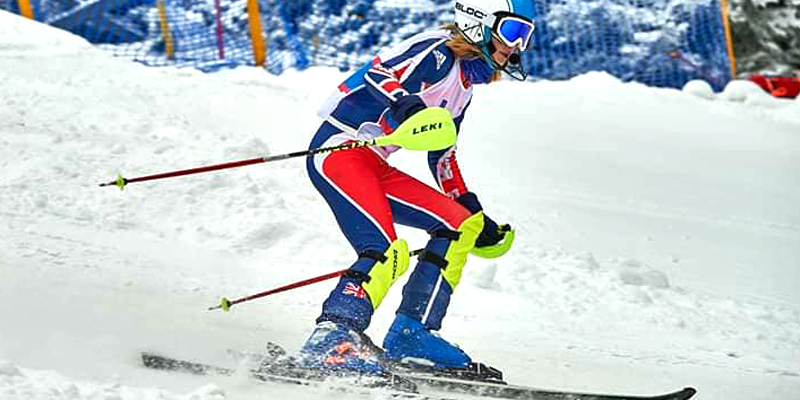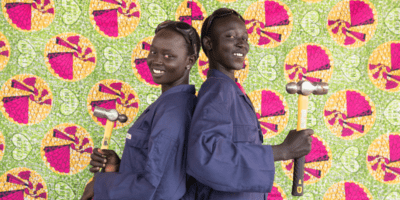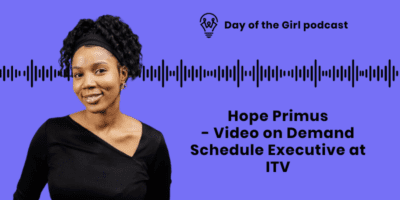Hester Poole is an international athlete, GB para-alpine championship skier and bronze medallist. She has recently taken part in the Channel 5 documentary, Puppy School for Guide Dogs, where her canine partnerships with her buddy dog, Dash, and more recently, her guide dog, Pickle, were filmed. In addition to studying for her A-Levels, Hester is a highly successful fundraiser, supporting para-sport charities and charities in Africa, not only to raise money for them, but also to raise awareness and challenge stereotypes about people who are blind and partially sighted.
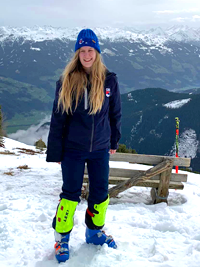
“It’s always important to champion girls and women, no matter what the date is, but I think it’s vital to have a marker. At the same time, this also brings home the idea of how ridiculous it is that it’s even necessary in this day and age that girls have to strive for equality in so many areas of life, education being one of them. That’s the door to everything else.”
Background
My name is Hester and I’m 16 years old, doing my A-Levels in Bath, Somerset. I’m also in the GB para-alpine development skiing team. I have done a lot of fundraising in the past for various organisations, and I’m also a guide dog owner.
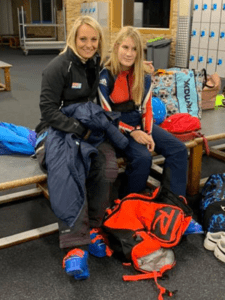
I started skiing when I was about seven years old, back in 2014 when the Paralympics were being aired. That really helped to kickstart my interest because I saw a Paralympic visually impaired partnership, which really inspired me: Kelly Gallagher MBE and her guide, Charlotte Evans MBE. They got the first ever winter GB winter gold and I took up race training around a year later.
I started getting into it slowly and then, totally unexpectedly, Charlotte Evans ended up as my coach. (I’m still not entirely sure how that happened!) Then it just went on and on from there. I started getting involved in competitions and also started winning a few, so at this point, I was noticed by Team GB. When I was about 12, I went to the European Para-Alpine Championships, and got my first proper podium. I got a bronze in that and following on from that I was approached and so now I’m on the development squad.
Perfect partnership
My guide is my older brother, Benjie, (which is very convenient!). He wears some sort of brightly coloured item of clothing, usually yellow, and we ski relatively close together. The distance depends on the discipline. In slalom it’s about three metres and in giant slalom, which is big gates and a longer course, it’s a little further away than that.
He goes in front and we have radio mic headsets with microphones in our helmets so we can talk to each other as we’re going down the course, and so I can use him and his brightly colouredness visually to follow him. I also have audio cues from him.
For people who don’t know what slalom skiing is, which is a surprising number of people, there are poles and you go in between them. As we’re going through the course there are small poles so I can’t see them until I’m a good five feet away. It’s quite a challenging job for Benjie as the guide because he has to concentrate on turning well himself, and also focus four or five meters behind him to where I am.
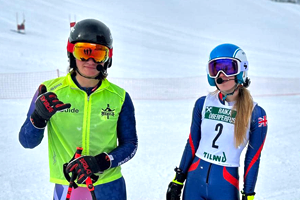
He’ll tell me when I should be turning and he’ll give me terrain markers. He’ll say things like: “Into the light” because light can affect my vision. It’s a great partnership and being siblings helps. It’s different for every pairing, but that’s how we work.
We usually train at Milton Keynes’ indoor snow dome, which is called Snozone Milton Keynes. We like to get out of the country about four times a year, but now I’m in the development team, it will step up. In the past, we’ve gone to places like Austria, Germany and France to practice on longer training courses. That’s where a lot of progress really happens, and that’s also where our competitions take place. Now I’m in the big leagues I think the plan is to have 50 to 80 days on snow, building up strength and conditioning.
100 Sports in 100 Days
When I was nine or ten, I set out to raise money for the ski team I was in at that time to be able to go abroad. I set myself a challenge, to do a hundred sports in a hundred days, which is pretty much what it says on the tin.
It was an interesting summer. We were frantically trying to look up more sports that I hadn’t done yet. It had a dual intention. The plan was to raise money for the visually impaired ski team I was on at the time. I managed to raise about £5,000 to fund two training camps, which Charlotte Evans supported, so that was amazing.
As importantly as the fundraising, it was also about showing people I could do all these sports. At that time, I’d got to a point in my life when I was getting quite frustrated at not being allowed to access things and people thinking I couldn’t do things, so I had a real drive to showcase everything that I could do.
Ethiopiaid
In addition to the fundraising I’ve done for skiing, I represented a charity called Ethiopiaid, which supports several good causes in Ethiopia. I primarily raised money for the Mekelle Blind School in Tigray, which supports blind children, giving them a chance at education. The funding also benefitted women’s safe houses and provided sanitary products.
While there, I ran a 5k race, which was at altitude, in the Women First Great Ethiopian run in Addis Ababa, which raised about £30,000. While I was there, I met an Ethiopian lawyer and disability rights activist, who is also blind, and who won the Spirit of Helen Keller Award for disability activism. Yetnebersh Nigussie was a massive inspiration and told me to go forth and do good things in the world and be an activist. https://www.youtube.com/watch?app=desktop&v=CkTFL1Ipo_Y
Puppy School for Guide Dogs
Most recently I have been involved in a programme that Channel 5 and the charity, Guide Dogs, made to promote the work that they were doing, called Puppy School for Guide Dogs. Channel 5 was asking around and doing their own research in cooperation with Guide Dogs, trying to find people at various different stages of the guide dog process. So, there was a puppy raiser, a ‘mummy’ dog and a ‘daddy’ dog, as well as their puppies, of course. Then there were the guide dog trainers and the puppies in class, and then there was me, somebody at the start of the Guide Dog process.
At this point I’d just been matched with a dog so they wanted to follow the process of my actual training from being matched to becoming a fully-fledged new guide dog owner doing it all on my own.
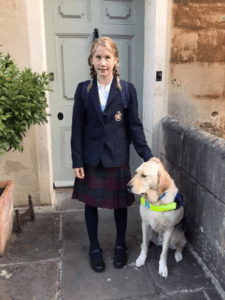
I’d be allocated a Guide Dogs buddy dog when I was seven years old. Dash was our first interaction with Guide Dogs, aside from support with my mobility and other things. They matched him with me to help build confidence and trust. Crucially, Dash also taught me how to look after a dog, because the intention was that I would get a guide dog when I was older, but I was far too young then.
So, he was a sort of dry run at this, but with less responsibility on me. People use buddy dogs for different things, but one of the most important is for gaining confidence, so he was a companion dog. What Dash did brilliantly was to help me learn the responsibilities of having a dog as I need those skills now I am a guide dog owner.
Dash safeguarded my confidence and taught me how to trust a dog, but without my mum having to say: “slow down” or “it’s dangerous”. That was the intention behind my partnership with Dash, and he carried out his role brilliantly.
So, more recently, Pickle came into the mix. I had been matched with her and then Anne-Marie Coles, our trainer, was there, helping us through every little thing. The process started off with Pickle coming for a couple of sleepovers. That’s when the bonding process began and I discovered what kind of a dog she was. This was vital because if there’s no bond, it’s not going to work. That’s when I discovered her personality, which is empathetic, and calm, but also playful. The bonding process was about five weeks.
Emotional impact
The emotional impact of having both dogs in my life has been enormous. With Dash, I struggle to remember life before him because I was quite young, so I didn’t fully understand the whole emotional impact that it was having on me. I just remember that I suddenly got an amazing dog, which was cool as a seven-year-old child.
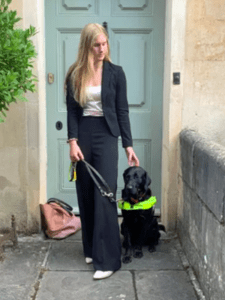
With Pickle, she’s sped me up again, which is quite funny as I’ve now gone full circle after I became a teenager and started realising the social pressures and stereotypes that have been placed on me, so that’s something I’ve really noticed.
Pickle has given me my stride back and brought me back to myself, speeding me up, giving me more confidence and more energy. Without her, I’d be using my eyes all the time for everything, which wasn’t sustainable, but now she just helps me not have to focus on using my eyes to get from point A to point B, so I can use my energy for my A-Levels, which are hard enough.
I had become a little bit cautious in the world because I’d had to navigate busy school corridors and get around a city. I desperately wanted to keep up with people but it wasn’t always possible to spend time with my friends, so it had begun to impact on me and how I felt about myself.
When Pickle arrived my mum said she saw my shoulders come down, my back straighten, and my head lift up as I was able to get back to going at speed and being confident, and being the Hester that she remembered. She said I grew a foot this summer, not physically, but in stature and in confidence.
Another reason why I wanted to take part in the programme is that I got a bit tired of the stereotypes. I don’t know if that was my conscious reason for doing it, but that definitely had an impact on how I wanted people to perceive me on camera. There’s a huge number of stereotypes that come with using a cane, or not, or using a guide dog, so I wanted to debunk some myths and to show myself as an academically able and highly social person.
International Day of the Girl
It’s always important to champion girls and women, no matter what the date is, but I think it’s vital to have a marker. At the same time, this also brings home the idea of how ridiculous it is that it’s even necessary in this day and age that girls have to strive for equality in so many areas of life, education being one of them. That’s the door to everything else. It’s the benchmark. It’s something that you need to have in order to achieve what you want to do, so the idea of somebody not having that makes me very sad.
Education is something that everyone needs to have access to, so a day to celebrate girls who have gone above and beyond to do things to prove people wrong, break down stereotypes and go beyond the norm is really important. On International Day of the Girl itself, Wednesday 11th October, I’ll be in school myself, exercising my right to an education, I suppose.
The fundraising I’ve done for charities like Ethiopiaid was really centred on getting education for girls, and blind girls in particular, because without access to education, visually impaired girls really had no chance in life. The run I took part in was alongside 13, 000 women and I don’t think it’s something that will ever leave me.
All the way back in the UK, I think all you can do is just keep doing the work you’re doing and keep fundraising, keep raising awareness, getting the best education you can and leading from the front. Be the arrowhead.
Coming up
In the meantime, I’ll carry on studying for the A-Levels I’m doing at the moment in English, literature, classical studies and philosophy. After that, I’d like to go to university. I hope the Paralympics will be in the mix too but alongside that, I’d be keen to pursue a career in the media and journalism, possibly within broadcasting.
Alongside my A-Level study, over the next year, I’ll be fundraising for the GB para-alpine development team. I’m always thinking of new campaigning ideas.
Media-wise, in addition to taking part in the Channel 5 show, I’ve also taken part in the Channel 4 Paralympic coverage, as well as appearing on BBC Radio 4 and doing some bits and bobs for my local BBC Radio station, Radio Somerset, as well as Radio Bristol. I’ve also taken part in a show for Nickelodeon. I’ve definitely been privileged to take part in some really fun things, and I hope those will continue.
Puppy School for Guide Dogs is available to watch on My5, so you can see my journey with Pickle there: https://www.channel5.com/show/puppy-school-for-guide-dogs
As well as supporting others with her fundraising efforts Hester also is very grateful to be supported by #GetKidsGoing and be a #SportsAid-sponsored athlete.
Main image credit: Adrian Stykowski / Polski Komitet Paralimpijski

